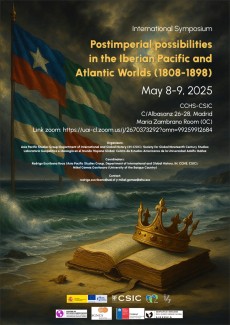Symposium "Postimperial possibilities in the Iberian Pacific and Atlantic Worlds (1808-1898)"
Venue: María Zambrano Room (0C9)
CCHS-CSIC, c/Albasanz 26-28, Madrid
Hybrid format (Link https://uai-cl.zoom.us/j/2670373292?omn=99259912684)
The Symposium "Postimperial possibilities in the Iberian Pacific and Atlantic Worlds (1808-1898)" departs from the hypothesis that nineteenth-century Hispanic world history has much to contribute to these discussions, especially if we conceptualise the Iberian Monarchies, the Ibero-American republics and the Luso/Spanish states of Asia and Africa as 'ambivalent empires' and 'post-imperial laboratories'. Most of these polities were subject to the informal imperialism of Britain, France and the United States as they sought to bring their state-building projects to success. These were not exclusively national: at times, they projected horizons of supranational organisation, while at others, they resorted to imperial practices such as territorial conquest, gunboat diplomacy, or settler colonialism. The symposium will accept papers that help us understand the ambivalent relationship that nineteenth-century Iberian Pacific and Atlantic Worlds had with imperialism and the experiments of postimperial political organisation that took place in them.
The event is organised in the framework of the Marie Curie Action 101148590 - POST-EMPIRE, Horizon Europe (HORIZON), which the European Commission funds through Grant HORIZON-MSCA-2023-PF-0.
It is also carried out within the framework of the Fondecyt Project Nº 1240232, “The political culture of post-imperial intervention. Spain and the South American Pacific Republics”, funded by the National Agency for Research and Development of Chile.
Organisers: Grupo de Estudios Asia Pacífico-Dpto. de Historia Internacional y Global (IH-CSIC); Society for Global Nineteenth Century Studies; Laboratorio Geopolítica e Ideología en el Mundo Hispano Global; Centro de Estudios Americanos de la Universidad Adolfo Ibáñez.
Comité Científico-Técnico:
Rodrigo Escribano Roca (CSIC)
Mikel Gómez Gastiasoro (UPV)
María Dolores Elizalde Pérez Grueso (CSIC)
Rebeca Viñuela Pérez (Universidad de Alcalá)
Gonzalo Serrano del Pozo (Universidad Adolfo Ibáñez).
Día 08/05/2025
10:00 (España) Apertura
10:30 Conferencia inaugural
A cargo de Frederick Cooper y Jane Burbank (New York University). Postimperial possibilities as a field of study.
12:00 Café de bienvenida
12:30-14:30 Panel I: La Monarquía española como experimento postimperial
Modera: Mikel Gómez Gastiasoro (Universidad del País Vasco)
Participan:
José María Portillo (Universidad del País Vasco)
Sergio Ceballos (Universidad de Cantabria)
Rodrigo Escribano Roca (IH-CSIC)
14:30-16:00 Comida
16:00-18:00 Panel II: Imperios a debate. México. Brasil y el Iberismo
Modera: Rodrigo Escribano Roca (IH-CSIC)
Participan:
Lucia María Bastos Pereira Das Neves (Universidad do Estado do Rio de Janeiro)
Rebeca Viñuela Pérez (Universidad de Alcalá)
César Rina (UNED)
DÍA 09/05/2025
9:30-11:30 Panel III: Cuba y Filipinas: laboratorios postimperiales crepusculares
Modera: Mikel Gómez Gastiasoro (UPV)
Participan: Alain Santos (Universidad de Valencia)
Javier Zúñiga (Universidad de La Rioja)
María Dolores Elizalde Pérez-Grueso (IH-CSIC)
11:30 Pausa café
12:00-14:30 Panel IV: Los Andes como laboratorio postimperial
Modera: Andrés Vicent María Fanconi (Université de Geneve)
Participan:
Natalia Sobrevilla (University of Kent)
Mikel Gómez Gastiasoro (Universidad del País Vasco)
Gonzalo Serrano del Pozo (Universidad Adolfo lbáñez)
Luis Alfredo de la Peña (Universita degli Studi di Firenze)
14:30-16:00 Comida
16:00-18:00 Panel V: Dinámicas transimperiales y posibilidades geopolíticas
Modera: Rebeca Viñuela Pérez (Universidad de Alcalá)
Participan:
Nicholas Sharman (University of Nottingham)
Diana Arbaiza (University of Antwerp)
Andrés Vicent María Fanconi (Université de Geneve)
18:00-18:30 Clausura



